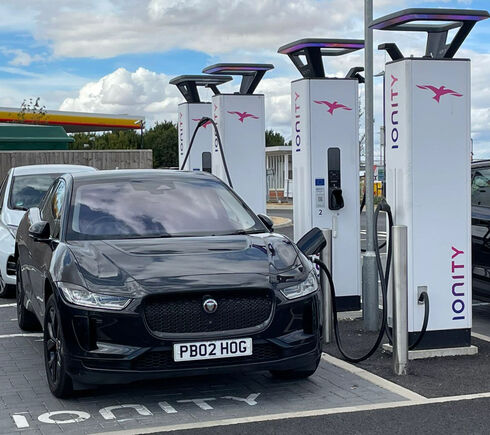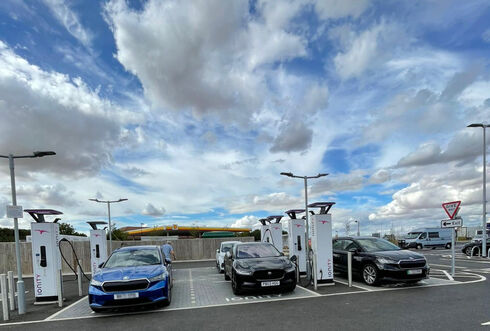
Charging forward
25 August 2022

Following the government’s series of announcements about improving the electric vehicle charging network, the provision of facilities is at last travelling in the right direction.
That’s the latest report from Peter Beach, sales and marketing manager with Genquip Groundhog, whose experiences of driving a Jaguar I-Pace (above) for business have formed an occasional series on the blog, which has been followed closely.
Peter lives in Sheffield and travels regularly to the company’s Neath headquarters, as well as to customers throughout the UK. He has often been frustrated by inadequate or non-functioning charge points, slowness of recharging and resultant range anxiety.
However, he was recently delighted to find an ‘ultra-rapid’ charger at Cambridge Services on the A14 during the return leg of a journey from Sheffield to Billericay in Essex.
The government's aim is to have at least six such charge points at each of England’s motorway service areas by 2023.
“It had a charging capacity of up to 350kW,” Peter told me. “I arrived with 38 per cent of battery charge remaining, or 79 miles, and it reached 48 per cent, or 102 miles, in just six minutes. So that’s a huge improvement from where we were, say, a year ago.
“By comparison, if I charged up via a standard 3-pin 240V domestic socket it would take me three days to get a full charge. Using my dedicated charger at home, it takes ten hours.”
Some early chargers were 7kW, while so-called ‘rapid’ chargers typically operate at 43kW to 50kW, and one of the frustrations is that not all charge points are the same.
Charging capabilities also vary from car to car, but ‘ultra-rapid’ chargers can typically give 0 to 80 per cent battery capacity in half an hour if the vehicle can accept the highest charge rate.
On his Essex trip, Peter stopped to charge up at Peterborough Services on the A1 for 20 minutes using a 120kW charger, and an hour charging at Cambridge gave him enough power to get home, and more besides, after the 360-mile round trip.
However, there is often a downside and in this case it is the cost. Ultra-rapid charging seems to come at 'ultra' charges.
Peter says it cost him 69p per kW, meaning that to reach full capacity from zero would cost more than £90. That would give a maximum 240-mile range in the I-Pace, making it much more expensive than petrol or diesel, even at motorway services prices.
Many people typically pay around 30p per kW now to charge at home (a year ago it was about 9p), but that will rise when the higher electricity price cap is announced tomorrow and it will be increased again in the new year.
“The idea is probably that you would use these ultra-rapid chargers when out and about for a quick top-up and then recharge fully at home. But the idea of running an electric vehicle being cheaper is becoming a bit of a fallacy,” said Peter.
Of course, your mileage may vary, as the saying goes. For a low-mileage commuter who can charge up at home, electric vehicles seem to be a decent option, but for those covering longer distances in unfamiliar territory, ultra-rapid costs could soon rack up.
Photos: Peter Beach


